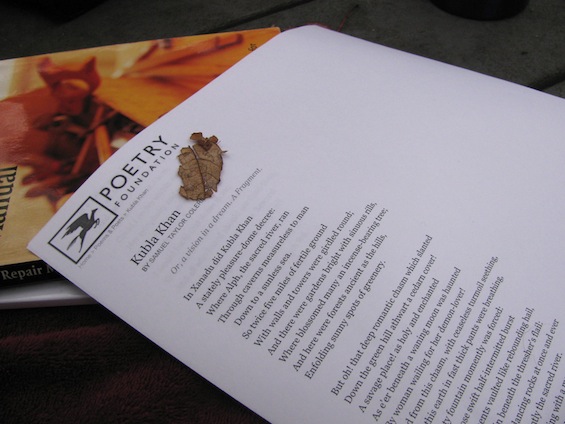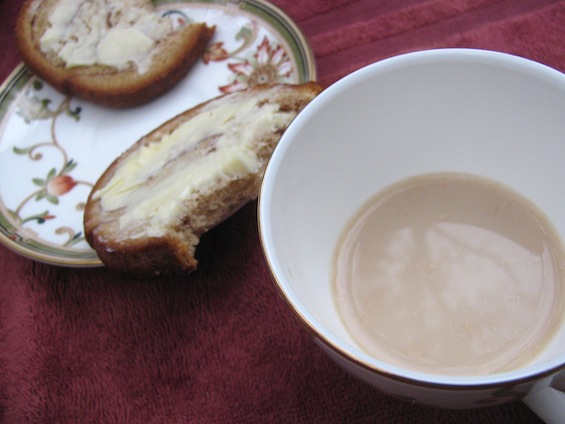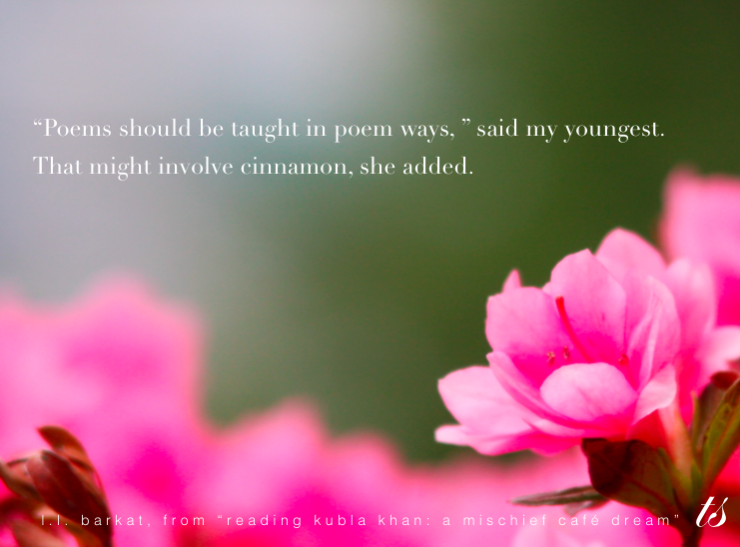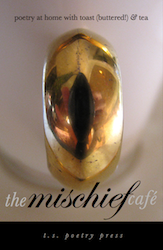“Poems should be taught in poem ways, ” said my youngest. That might involve cinnamon, she added.
I agree. It might also mean reading Ulysses in the woods. Or, a week later, taking tea on cranberry towels set down on that same secluded woodland platform where Ulysses was read.
[Tweet “Poems should be taught in poem ways.”]
The official kickoff for our new Mischief Café—tea, toast, and poetry at home—is October 29, in Basking Ridge, New Jersey. But all good mischief needs its own subversion, as Lewis Hyde notes about mischief-makers in Trickster Makes this World: Mischief, Myth, and Art. “He is the character in the myth who threatens to take the myth apart.”
[Tweet “He is the character in the myth who threatens to take the myth apart.”]
So while the official kickoff is on its way, my eldest and I went back to the woods for an unorthodox Mischief Café. I had planned to include the plastic duck who seemed to be a fixture at the platform, but when we got there he was gone. And, my daughter apologized, she’d forgotten to bring something mischievous (my request), so we decided to take off our hiking shoes, set out our cranberry towels, read Kubla Khan with tea and untoasted toast, and let that be enough.
“I kept trying to figure a way to get a toaster to the woods, ” said my daughter. And we laughed about the heated-tongs iteration of the dream, and we laughed about the whole idea of bringing a toaster to the woods. Though I secretly wondered if all innovation begins with what appear to be crazy dreams.
[Tweet “I kept trying to figure a way to get a toaster to the woods”]
I’d brought along two books as sources for possible readings, but, except for one poem from Kooser, it was not to be. My daughter had printed out a copy of “Kubla Khan, ” its own kind of dream, and so reading Kubla Khan would take center stage.
She read it to me, in hushed tones, across our buttered (but not toasted) cinnamon bread. Besides The Highwayman, “Kubla Khan” is apparently her all-time favorite poem. I did not know that. We reread some of the lines we noticed were repeated in variations and noted that dreams do that—seem to repeat, and yet turn the vision as they go. She told me Coleridge had a habit of saying his poems came from dreams, and that, for the poems he wasn’t so pleased with, he’d claim he’d forgotten the best part of the poem. We agreed that “Kubla Khan” feels finished, though, and so we thought he should just let it go. The poem is lovely and needs no defense from its poet. As for the matter of the poet, she pointed out that he is actually in the poem, doubting himself…
Could I revive within me
Her symphony and song,
To such deep delight ‘twould win me
That with music loud and long,
I would build that dome within the air!
Perhaps my daughter was hesitant to break the dream, but she did not seem interested in reading more poems. Our conversation turned to matters of humanity’s propensity for periodic destruction and the importance, perhaps, of providing experiences of controlled chaos or battles. I said “sports.” She said, “The Olympics” and “Saturnalia.” I had never heard of Saturnalia, which provides for the subversion of roles, like masters serving slaves for the day.
We also discussed certain dismal approaches to teaching essays, and I asked her how she thought they should be taught. “People should read the greatest essays, not try to write terrible ones. They should explore what makes those essays great.” And, since she said the root of all good essays is the ability to present a cogent argument, we decided that students and children should not be shut off when they attempt, in the regular course of life, to argue. Rather, they should be encouraged to make their best points, and if “they win, ” then they should be able to carry on with what they were doing (and were about to potentially get in trouble for).
After what seemed too soon (but we had to leave to pick up her sister from choir), we packed the empty thermos, our tea cups, and Kubla, and we walked out of the woods in the near-dark. The trees curved over us like a soft cave. She told me it felt like a dream.
Through wood and dale the sacred river ran,
Then reached the caverns measureless to man…
[Tweet “She told me it felt like a dream.”]
Kubla Khan
Or, a vision in a dream. A Fragment.
In Xanadu did Kublai Khan
A stately Pleasure-Dome decree,
Where Alph, the sacred river ran
Through caverns measureless to man
Down to a sunless sea.
So twice five miles of fertile ground
With walls and towers was girdled ’round,
And there were gardens bright with sinuous rills,
Where blossomed many an incense-bearing tree;
And here were forests ancient as the hills,
Enfolding sunny spots of greenery.
But, oh! That deep, romantic chasm which slanted
Down the green hill, athwart a cedarn cover:
A savage place! As holy and enchanted
As e’er beneath the waning moon was haunted
By woman wailing for her Demon Lover!
And from this chasm with ceaseless turmoil seething,
As if this Earth in fast, thick pants were breathing,
A mighty fountain momently was forced,
Amid whose swift, half-intermitted burst
Huge fragments vaulted like rebounding hail,
Or chaffy grain beneath the thresher’s flail;
And ‘midst these dancing rocks at once and ever,
It flung up momently the sacred river!
Five miles meandering with ever a mazy motion,
Through wood and dale the sacred river ran,
Then reached the caverns measureless to man,
And sank in tumult to a lifeless ocean.
And ‘mid this tumult, Kublai heard from far
Ancestral voices prophesying war!
The shadow of the Dome of Pleasure
Floated midway on the waves,
Where was heard the mingled measure
From the fountain and the caves.
It was a miracle of rare device:
A sunny Pleasure-Dome with caves of ice!
A damsel with a dulcimer
In a vision once I saw:
It was an Abyssinian maid,
And on her dulcimer she played,
Singing of Mount Abora.
Could I revive within me
Her symphony and song,
To such deep delight ‘twould win me
That with music loud and long,
I would build that dome within the air!
That sunny dome, those caves of ice,
And all who heard should see them there,
And all should cry: “Beware! Beware!
His flashing eyes, his floating hair!
Weave a circle ’round him thrice,
And close your eyes in holy dread:
For he on honeydew hath fed,
And drunk the milk of Paradise!”
—Samuel Taylor Coleridge
Photos and post by L.L. Barkat.
Make your own Mischief Café? Bring poetry home (or to the woods).
- Poetry Prompt: In the Wild Secret Place - January 6, 2025
- Journeys: What We Hold in Common - November 4, 2024
- Poetry Prompt: My Poem is an Oasis - August 26, 2024




Maureen Doallas says
Wonderful!
L. L. Barkat says
I thought of you while we were there, Maureen. I thought you would have absolutely loved the conversation (and the poem and the toast and tea 🙂 )
Jody Lee Collins says
Sounds like you’re raising a wise future teacher!
L. L. Barkat says
The youngest has teaching aspirations. 🙂
The eldest prefers small mentor type relationships. It was funny, you know, while she was talking (so deeply, so intelligently, with such aplomb and clarity), I suddenly had this vision of her on some stage being interviewed. I can’t imagine how she’d get there, but I saw it whole.
Katie Andraski says
This is wonderful. What fun for you and your daughter. My mom started a school that emphasized learning as an adventure and her logo was a child in a tree with a book. She wanted show young people how learning could be fun and save them from the boring nature of school. The Helderberg Workshop was founded in 1960 with a few housewives as volunteers and it continues today.
SimplyDarlene says
fascinating!
L. L. Barkat says
Very cool, Katie. I may have to direct my daughter to that, as she hopes to found a school someday. 🙂
Katie Andraski says
It’s called the Helderberg Workshop and it’s located outside of Albany. I think they have a website. My mom pioneered outdoor education and she also bused kids from the inner city out to the workshop as well. This was pretty radical for the sixties.
Educators said she’d never get kids in school in the summer but she proved them wrong. It went from 60 kids to 600. Looking back I had a pretty amazing childhood as I got to rub shoulders with people from NASA and an archeologist.
Someone could do quite a research project on it. The Workshop is now different than she envisioned but it’s still going, which is an amazing legacy.
I bet your daughter and I could have some interesting conversations. If she’s interested in public relations, she should read my novel as it gives a taste of that work.
SimplyDarlene says
a lonely tree
reflects himself in
a lady’s tea cup
as she toasts the poet –
writer
and reader
and hearer
another butters up
beauty
on cranberry
towels
L. L. Barkat says
Sweet!
I especially like “she toasts the poet”
Megan Willome says
Ah, tricksters! One reason I love crows.
L. L. Barkat says
My youngest did a cool presentation on crows. They are amazing. And one of her favorite videos is of a crow using a lid as a sled on a roof!